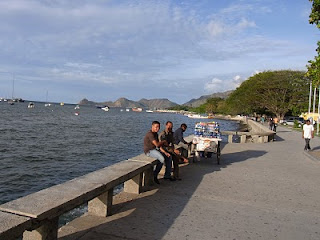
When East Timor (Timor Leste/Timor Lorosae) became the first new country of this century in 2002, language was hardly at the top of its list of problems. 500 years of colonial occupation but little economic development by Portugal, followed by 24 years of oppressive rule by neighbouring Indonesia, had left the country poor, divided and isolated. Worse, when the Indonesians withdrew in 1999, their army and its supporters destroyed most of the infrastructure and killed or kidnapped thousands of people. Although finally independent, the Timorese had little choice but to turn to foreigners for help, and various UN-related organisations are to be seen everywhere dominating educational, economic and social policy. Slowly, this country on the southeast edge of Asia is getting back on its feet. But language problems are occupying more and more of the government's time.

With a population of only a million or so, Timor Leste has at least 26 local languages. One of them, Tetun Prasa, is understood quite widely, but it has never been used much for education, business, government or law. Portuguese was the main language of education for the people who fought against the Indonesians and now control the government. But less than 15% of the population understand it, and Timor is far from from other Portuguese-speaking countries such as Brazil, Mozambique, and Portugal. Indonesian is more easily learnt and remains widely understood not only because of the occupation but also because many teachers continue to train in Indonesia. But many government officials are reluctant to promote the language of their former enemies. And then there is English. Australia, only 90 minutes away by plane, is the most active country in the UN bodies helping to rebuild the country. Other UN and NGO workers mostly use English when they consult each other. And increasing numbers of Timorese are interested in learning the language so they can study or work overseas.

Timor's 2002 Constitution makes both Tetun and Portuguese official languages while giving a role to Indonesian and English as working languages. But can a small, poor country afford to support four languages? And what about the 25 other local languages? As in many poor countries, most people take a very pragmatic view, learning whatever language they think can best get them an education and a job, and often speaking several of them very well. Meanwhile the government is allowing Tetun to be used in the legal system and making efforts to modernise the language. Thousands of technical terms have been borrowed from Portuguese, and some from English and Indonesian. But this makes the language even more difficult for people far from the main towns to understand.

East timor as the world's poorest and least developed countries, only lean on the help of the world can survive. Natural language has become an indispensable tool. Although east timor Portuguese is the official language, but the use of the work and the life of people more German language, it also has relationship and local tradition. In today's world of communication directly necessary for the development of countries and topics, the importance of the visual language is so arrogant.
ReplyDelete